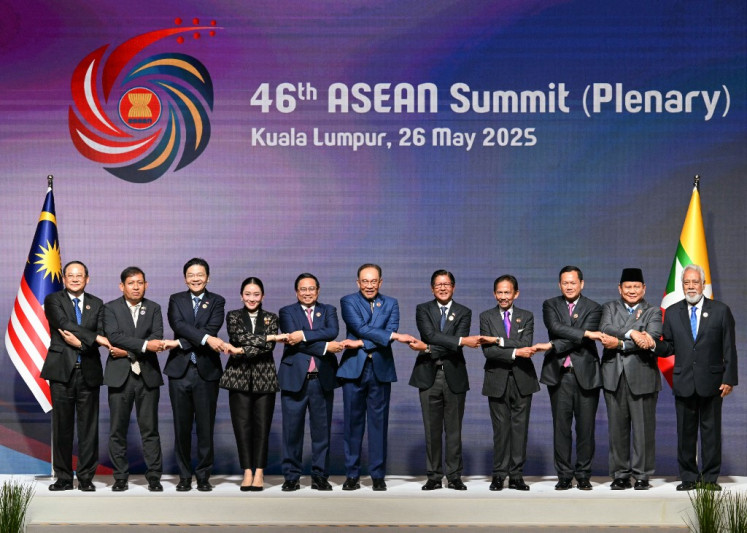'Middle path' Islam must drown out terrorists' beliefs
Terrorism is a multifaceted issue, triggered by both radical understanding of Islamic teachings and structural determinants.
Change text size
Gift Premium Articles
to Anyone
 The concept of Washatiyyah Islam is well entrenched in the Quran. In Surah Al Baqarah (The Cow) verse 143, the Quran characterizes Muslims as a middle community (ummatanwashatan). (Shutterstock/*)
The concept of Washatiyyah Islam is well entrenched in the Quran. In Surah Al Baqarah (The Cow) verse 143, the Quran characterizes Muslims as a middle community (ummatanwashatan). (Shutterstock/*)
T
errorism is a multifaceted issue, triggered by both radical understanding of Islamic teachings and structural determinants. Those two factors are inseparable. We cannot just blame extreme religious paradigms while neglecting structural factors, or vice versa.
First, terrorism stems from erroneous methods of reading the Islamic sacred texts. Terrorists mainly embrace three common fallacious methods.
The first one is a partial or atomistic approach. The Quran, like other canonical texts from other religions, has certain passages often used to sanctify terrorism. Readers should not stop at one of a few scattered verses. Instead, they have to strive to get the comprehensive message of the Quran to avoid the wrong conclusion.
About a dozen Quranic passages strongly denounce the killing of innocent people. Terrorists, unfortunately, embrace the notion that the Quranic verses, as well as the Hadith or Prophet’s sayings, can be read partially, ignoring the complete picture of the Islamic message.
The second method of reading religious common among extremists is adhering to a literal understanding of Islamic canonical texts and neglecting general objectives of Islamic rulings.
Muslims scholars have agreed there are five objectives of Islam, namely preservation of the soul, religion, intellect, offspring and wealth. Moreover, they also agreed upon a notion that every single passage in the Quran has a ratio legis, a realization of human interest. This notion implies everything that contradicts the achievement of common good should be discarded and considered un-Islamic.
Regrettably, those terrorists lack or dismiss knowledge about the general purpose of Islam and instead rely only upon literal reading. For them killing people is an order from the holy book and thus acceptable -- ignoring the fact that this kind of verse should be understood within its historical context and should be subsumed under the general objective of Islam.
The third misleading method that underpins acts of terror is reading the legal verses of the Quran without consulting any traditionally recognized established authorities. Many terrorists who typically graduated from secular institutions instead of Islamic seminaries formulated discourses entirely foreign to Islamic tradition. In other words, their discourses have no intellectual precedent in Islamic traditions. For instance, the idea that killing innocent people can be justified or that the aims of a state should include establishing an Islamic caliphate -- neither have any grounding in Islamic classical intellectual legacy.
Regrettably, leaders of terrorists reject academic authorities and the sophistication of the legal tradition in Islam, asserting their interpretations have equal or greater authority than those of prominent classical Muslim scholars.
The second factor is structural. In other words, the above misguided paradigms work in tandem with objective circumstances.
The structural factors are also quite complex phenomena. A first major structural factor behind terrorism, although not overtly uttered, is reflected in people’s dissatisfaction with the government. Those terrorists exploit disappointment with government failure to eradicate poverty and economic inequality. This frustration and anger make ordinary people vulnerable to terrorist recruiters and their interpretation of Islam.
Secondly, terrorism also stems from feelings of victimization within an unjust global system. Every day they hear about terrible global facts such as the United States’ military intervention in several Muslim countries, about autocracy and the absence of freedom in the Middle East, and sectarian conflicts in some Arab countries. These problems summon their empathy and awaken their fury. They feel that they share responsibility as members of the global ummah or Islamic community to overcome those issues.
How can we get rid of terrorism in Indonesia?
In early May, the Office of the Special Presidential Envoy for Interfaith Dialog and Civilization Affairs successfully held the international Muslim Scholars’ Summit.
One of the conclusions was that Indonesia should strive to disseminate the concept of Washatiyyah Islam (middle-path Islam). The Summit also suggested this concept is the platform that every Muslim, regardless of their affiliation and stream, should promote.
The concept of Washatiyyah Islam is well entrenched in the Quran. In Surah Al Baqarah (The Cow) verse 143, the Quran characterizes Muslims as a middle community (ummatanwashatan).
What does washatiyyah in this verse refer to?
The Summit determined seven virtues that this term entails. Those virtues are: tawassuth (centering position among various extremist tendencies), i’tidal (proportional and just behavior), tasamuh (tolerance to differences), shura (consultation to achieve consensus), islah (constructive behavior for common interest), qudwah (good initiation in leading humankind into kindness) and muwathanah (admitting nation-state and respecting citizenship).
These seven virtues have been applied in Indonesian Muslim communities since the early arrival of Islam until the modern period, and are familiar to most Muslims in Indonesia. They need to be revived and disseminated more massively among Indonesian Muslims to lessen the radical voice of those terrorists.
Propagating this concept would have a serious impact on eradicating extremism and terrorism in Indonesia. The government should change their discourse of deradicalization into washatiyyah Islam to more effectively reduce extremist beliefs.
But more importantly, the government definitely should work very hard to address the structural factors that fuels terrorism.
***
Muhamad Rofiq is a first-year PhD student in the Department of Religious Studies at the Arizona State University. He pursued his bachelor on Shariah Islamiyyah at Al-Azhar Universtiy in Cairo and his master from Universitas Gadjah Mada in Yogyakarta Indonesia on Middle Eastern Studies. He is also a lecturer at Universitas Muhammadiyah Yogyakarta, Indonesia. His facebook account is Muhammad Rofiq (https://www.facebook.com/muhammad.rofiq.180)








